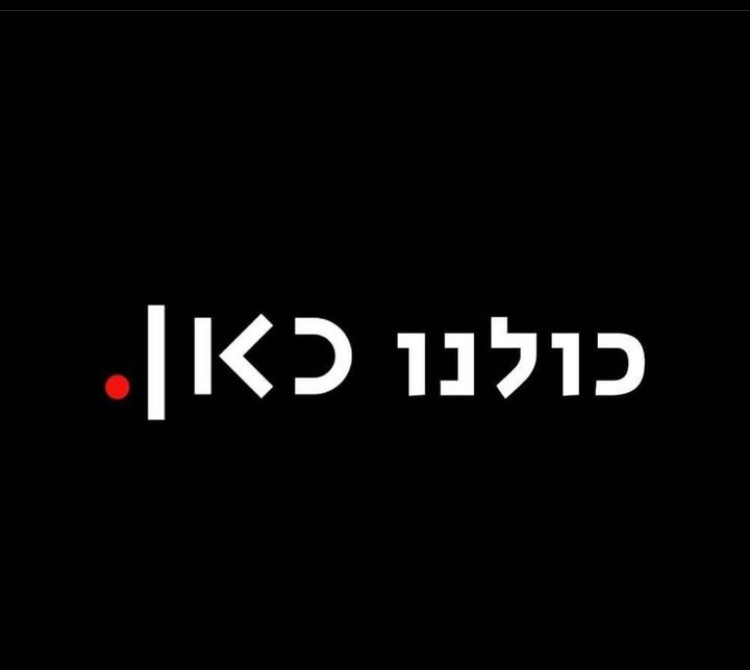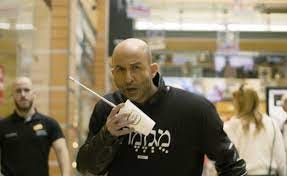Kulanu Kan
A few days before the latest round of Israeli elections (number five in four years, but who’s counting?), a reporter on the public broadcasting station Kan played a recording of MK (now Finance Minister) Bezalel Smotrich calling Netanyahu a “lying son of a liar.” It’s certainly not the first time Netanyahu’s been called a liar. (Melissa fondly remembers the tiny ad that appeared on the front page on Ha’aretz every day of his prime ministerial tenure in the 90s that read simply, “Bibi shakran,” or “Bibi is a liar”) But now that Bibi has regained power and installed a stable of government ministers far to his right, the incident triggered a series of political moves designed to impede public speech in Israel.
Long time Netanyahu lackey and Likud MK Boaz Bismuth introduced a bill which would prohibit the publication or release of any recording that contains “sensitive information,” which includes, according to the language of the law, “opinions.” Not only is Bismuth a shill for Bibi and a recent Masked Singer Contestant, he served as the editor-in-chief of the pro-Netanyahu free daily Yisrael Hayom (Israel Today). So if your opinion is that Netanyahu is the lying son of a liar, or that there should be a ban on future seasons of the Masked Singer, you’d have to keep that to yourself. (Or at least whoever recorded you saying it would not be allowed to publicize it.)
Bismuth’s bill is concerning enough, but the new Minister of Communications Shlomo Karhi announced even before the new government was confirmed that he hoped to completely defund Kan, Israeli Public Broadcasting Corporation, which started in 2017 after Bibi forced the closure of its predecessor, the IBA. Karhi and his supporters claim Kan is anti Bibi and too liberal–not unlike the way Republicans view NPR in the United States.
Karhi has declared that “there should not be public broadcasting,” but rather that the free market should reign in the arena of radio and television. And while the government has for now claimed that the plan has been postponed until the proposed judicial reforms are passed through the Knesset, many journalists and politicians are skeptical. The Union of Journalists in Israel issued a statement noting that they would not stop fighting changes to public funding for broadcast services until the government and Karhi publicly commit their continuing support.
While the Israeli news media has largely framed this as a battle over journalistic balance, its implications are far wider. Many of the television shows that we love, including the sketch comedy show Hayehudim Baim (The Jews are Coming), Hamefakedet (The Commander), and the yearly Eurovision song contest broadcast, as well as shows that are streaming on American platforms and beloved by international audiences like Sha’at Neilah (Valley of Tears, HBO), Hazarot (Rehearsals, Hulu), and Tehran (Apple TV) are all produced by Kan.It’s hard to imagine any commercial station, for example, making the recent documentary about the newly discovered tapes of Adolf Eichmann, which was just bought by Amazon Prime. Simply put, Kan is responsible for some of the best television in Israel and some of the best Israeli cultural exports to the rest of the world.
Not long after Karhi launched his campaign against the station, many prominent Israeli celebrities, most of whom have worked with or for Kan at one time or another, began to post a black screen with the words “kulanu kan,” which can mean both “we are all Kan (the broadcasting station)” or “we are all here.”
Luckily, Israel still has a robust entertainment industry with a penchant for satire. A couple of weeks ago the popular sketch comedy show Eretz Nehederet (Wonderful Country), which often takes aim at Israeli political figures, released a sketch that began with the announcement, “The Minister of Communications presents the new Kan 11.” What followed was a series of imagined Kan shows for an era of right-wing government control, like carpool karaoke with Karhi and Minister of Transportation Miri Regev joking about deregulation (“Put on your seatbelt, Miri”; “No need, Shlomo, we canceled that rule”) and singing racist Beitar chants (just another charming quality many of the new government’s ministers have in common - anti-Arab racism!).
The last few weeks have seen tens of thousands of Israelis protesting in the streets against proposed government changes to the judicial system as well as the free press, and so far nothing is final. But for now, the fate of public broadcasting, and so much of the Israeli television that we love, is up in the air.
Why We Hate Fauda and Will Not Be Watching Season 4: A Listicle of 4 Reasons for 4 Seasons
The fourth season of the acclaimed television show Fauda, which follows the activities of an Israeli counter-terrorism unit, was recently released. We hate Fauda and will not be watching the new season (if we are honest, neither of us watched past season 1). Here’s why:
It’s misogynist
Much like the IDF itself, which prides itself on “universal conscription” and claims to be egalitarian, Fauda only pretends to love women. The first season (again, this is all we watched, and it was enough!) features a number of “strong” women characters, notably the Palestinian physician Shirin, but none of them are actually much more than window dressing for the valorization of a violent masculinity that defines itself in opposition to an archetypal nurturing femininity (represented by Shirin - she takes care of people! - as well as Abu Ahmad’s wife Nasrin) or a femme fatale type (Nurit, the only woman in the counter-terror unit, who gets special privileges because she’s sleeping with the commander - yes, it is a tired plot!).
It’s repetitive and boring
If the characterizations of the women described above seem silly and one-dimensional, that’s because they are, like pretty much all of the characters in the show. Not to mention that there are a limited number of available plots for a show about hunting terrorists (namely, counter-terrorism unit searches for and finds terrorists, killing a lot of people and blowing a lot of things up along the way), so the stories are pretty dumb. The writing’s not good either - the dialogue is cliched and as you might imagine in a show that is mostly about action, there isn’t all that much of it.
It glorifies violent conflict
We don’t know if this even needs an explanation. It’s a violent show about violence, and the supposedly “good guys” do a lot of violent stuff. A lot of the violence seems entirely unjustified (which is pretty realistic, actually), starting with the very beginning of the show, when the main character, Doron Kavillio, screws up the first mission by killing someone he absolutely did not have to. Many Palestinians have complained that the show is racist, including Sayed Kashua. Also, we are already anxious enough already!
Lior Raz is a terrible actor (the worst, actually!)
He’s awful. No way he would have gotten the lead in this show or any other if he hadn’t written it himself. He’s bad in absolutely everything he stars in. We would tell him not to quit his day job, but, well…
Zionism at the Convenience Store, or 7-11 opens in Israel
A few weeks ago, I (Shayna here) had a few minutes to spare before a meeting. Naturally, I tuned in to the Instagram Live Feed from the launch of 7-11 in Israel, straight from Dizengoff Center, perhaps Israel’s most famous mall. Following weeks of a social media blitz, including 7-11 swag packs to various Israeli influencers, the store opened with much fanfare. In a packed store, visitors could spin a giant wheel to win prizes–everything from free donuts to an iPhone. The broadcaster spent much of his time correcting those who called the infamous Slurpee a “barad,” the Hebrew word for a slushy icy drink, and insisting that the two were totally different genres (if you think you’ve heard that word before, yes it is because barad is one of the ten plagues and means hail as well as sweet sweet slushy ice). Actor/Producer Guri Alfi and the hip band Jane Bordeaux also showed up. Good for them! Get that 7-11 shekel.
Many Israelis, like others around the world, lament globalization and argue that it swallows up smaller local cultural artifacts in favor of a hegemonic monoculture. While we love the classic Kaveret banger “Shir Hamakolet” just as much as anyone else, these claims of cultural erasure are overly simplistic. What results instead is what some scholars call the “glocal”, or local versions of global culture. Shayna had a student at USNA who told her that his favorite activity was to eat at McDonalds in every country he visited and compare the menu variations. A perfect example of the glocal!
While in America 7-11s are sometimes seen as lower class, for example, they are hugely popular in Asia, especially Japan, where their fresh food is often praised on social media accounts with millions of views. The 7-11 chain in Israel developed a line of Israeli foods to showcase in the stores along with their giant fountain drinks and self service hot dogs, hoping to draw in Israelis who want a taste of the glocal with their snacks. Also, Israelis revel in the capitalist spectacle that comes with a foreign brand stateside, similar to the craze that comes with any musician agreeing to perform in Israel. Israelis, like so many small countries, crave external approval, and 7-11 is a perfect sign that Israel’s made it–a nation just like all the others, just as many Zionists dreamed of for the Jewish people. Or something like that.
The chain plans to open dozens more locations around Israel. While the first location is not kosher, 7-11 has not ruled out kosher stores, which would truly fulfill the Zionist dream especially for many religious American Jews. (Message to 7-11: think like Herzl. If you will it, baby, it is no dream!)
Will 7-11 succeed in the Holy Land? That’s anyone’s guess. Many other international chains, most famously Starbucks, have failed in Israel. But we have a sense that soon enough, there will be a Shir HaSlurpee.
Big news for all you Reshaim Arurim:
A Shtisel spin-off is in the Works!! Supposedly it will focus on Nuchem, played by the perfect Sasson Gabbay. We got an exclusive drop of the theme song.
More Masked Singer News:
Linoy Ashram, rhythmic gymnast and Israeli gold medal winner, is the Artichoke! Little known fact: when you agree to represent Israel in the Olympics, you also agree to go on the Masked Singer if you win a medal. So, it was only a matter of time. She was pretty good!
Selling Sunset in the Holy Land
Mary and Romain of Selling Sunset fame went to Israel in the crossover event of the season for...Shayna and Melissa.
What’s Aviv Alush Up To (Yes, this is a Who Weekly Shoutout. Aviv is our Rita Ora.)
Hey Aviv, where do we get this Moshiach necklace? Asking for a friend
Kulanu Kan,
Shayna and Melissa
P.S. Shayna interviewed Chanshi creator and actress Aleeza Chanowitz for Identity/Crisis, a podcast from the Shalom Hartman Institute of North America. You should listen!









